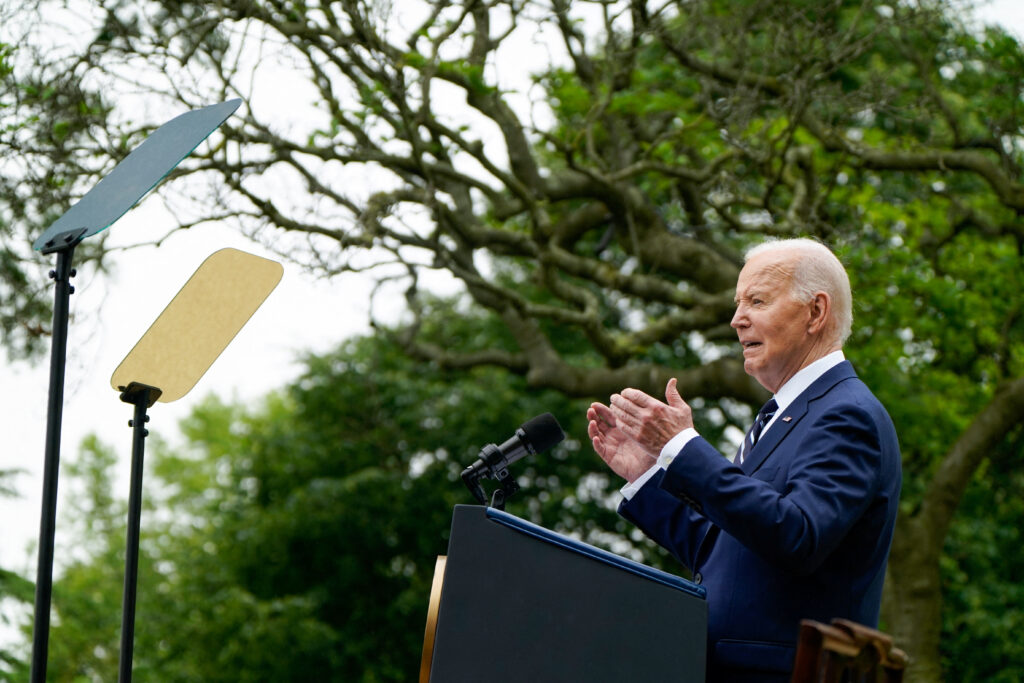A century ago, the Republican Congress passed the Fordney–McCumber Tariff of 1922. This post-First World War effort to protect the United States from German competition and rescue business from falling prices sparked a global wave of tariff hikes.
While long forgotten, echoes of Fordney–McCumber now reverberate across the US political landscape. Once again, politicians are grasping the tariff as a magic talisman against economic ills — the rise of China, the plight of workers and the general unfairness of the world economy.
The Democratic Party of the 1920s opposed tariffs as harmful to consumers and farmers, but today both President Joe Biden and former President Donald Trump pray for national delivery through protection. Since the two candidates are locked in a death struggle for the electoral affection of six swing states — Arizona, Georgia, Nevada, Pennsylvania, Michigan and Wisconsin — the test is whose prayers are most convincing.
Trump, believing that stark numbers will capture the affection of voters, promised his second term would see 60 per cent tariffs on everything arriving from China and 10 per cent tariffs on imports from the rest of the world, apparently including imports covered by 14 free trade agreements with 20 partners. He initially promised 100 per cent tariffs on electric vehicles (EVs), but when Biden declared that he was hiking tariffs on EVs from China to 100 per cent, Trump raised the ante to 200 per cent.
Mindful that inflation is one of his top electoral weaknesses, Biden has advocated a ‘strategic’ approach. On 14 May 2024, the White House slapped tariffs ranging from 25 per cent (on items such as steel, aluminium and lithium batteries) to 50 per cent (semiconductors, solar cells, syringes and needles) and 100 per cent (electric vehicles) on Chinese imports. Other Chinese products are teed up for protection, such as cranes and rare earth magnets. Administration officials offer national security and supply chain vulnerability as justification.
To deflect worries about inflation, US Trade Representative Katherine Tai declared, ‘first of all, I think that that link, in terms of tariffs to prices, has been largely debunked’. Contrary findings by the United States International Trade Commission and a number of distinguished economists, as well as Biden’s own 2019 statement criticising Trump’s tariffs — ‘Trump doesn’t get the basics. He thinks tariffs are being paid by China… [but] the American people are paying his tariffs’ — forced Tai’s office to wind back her declaration.
At this point, Trump and Biden have already committed the United States to tariffs of 25 per cent on more than half of all imports from China, even higher tariffs on Biden’s list of 12 Chinese items, strong ‘Buy America’ rules on government procurement — no matter the cost in price, quality and delivery time — and a virtual ban on EV imports, fulfilling promises to the United Auto Workers.
If Trump is elected, higher protective walls against China and the world are guaranteed. If Biden is re-elected, he will face political pressure to ban imports of manufactured products that contain significant Chinese components.
Both candidates are now wedded to visions of triumphant industrial policy. For Biden, massive subsidies — the CHIPS and Sciences Act and the Inflation Reduction Act — are the principal instrument of industrial policy, supplemented by trade protection. For Trump, extreme tariffs are the magic tool.
The fact that prohibitive barriers to imports of solar cells, batteries and EVs will delay the green economy carries zero political weight with Trump and little with Biden. Nor does either candidate worry about the prospects of Chinese retaliation and damage to the fabric of global economic rules. Historical lessons — unanticipated consequences of the foolish Fordney–McCumber Tariff of 1922 and the Smoot–Hawley Tariff of 1930 — are seen as irrelevant by the candidates and their advisers.
The United States’ lurch from its post-Second World War free trade principles offers China a golden diplomatic opportunity. China most certainly will retaliate, but a clever Beijing will confine retaliation to the symbolic realm by targeting a handful of iconic US products. On the world stage, China will espouse open trade and investment. China will encourage EV and battery firms to establish plants in Europe, Brazil, Mexico and elsewhere, essentially daring the United States to damage its own alliances by restricting third country imports containing Chinese components.
Global institutions — the World Trade Organization, the World Bank, the International Monetary Fund, and the Organization for Economic Cooperation and Development — will find it almost impossible to discourage member countries that choose to emulate the United States with their own opportunistic tariffs and subsidies. The power of bad example is hard to contain.
Whether the fabric of global economic rules that has delivered astounding prosperity to the world will survive through the 21st century remains to be seen. Much will depend on the decisions of other large economic powers, not only China but also the European Union and Japan, as well as middle powers, such as Australia, Brazil, Chile, ASEAN and South Korea. Their actions and reactions will shape the rules of the 21st century.
If others follow America down this costly path, the world will become less prosperous and vastly more unpredictable. If they resist, the United States risks being diminished and more isolated. Whatever emerges, history will see the Trump–Biden era as a turning point in world economic affairs.
Gary Clyde Hufbauer is a non-resident Senior Fellow at the Peterson Institute of International Economics.


US President Joe Biden and former President Donald Trump are advocating for steep tariffs, echoing the protectionist Fordney–McCumber Tariff of 1922. Despite potential international retaliation, risks to global economic rules and a shift from post-Second World War principles, the two politicians have promised to increase trade barriers against China, causing concerns for the sustainability of global economic harmony